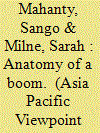|
|
|
Sort Order |
|
|
|
Items / Page
|
|
|
|
|
|
|
| Srl | Item |
| 1 |
ID:
147457


|
|
|
|
|
| Summary/Abstract |
This paper examines how a boom in industrial cassava served as a ‘gateway’ to intensify capitalist relations in Cambodia's north eastern borderland. Situated on Cambodia's border with Vietnam, Mondulkiri province has experienced a rapid increase in cassava production and trade since 2006, with transformative consequences for the region's forests and farmers. Using field data from 2012 to 2014, we explore how the boom ignited and intensified over time, through a conjuncture of conditions. Alongside strong market demand for cassava, these included resource abundance (soil fertility, timber, land, labour), connectivity to markets and cross border networks, and facilitative governance conditions. Over time, the boom strengthened capitalist relations, particularly through farmer debt and the revalorisation and accumulation of land. However, unlike booms of tree crops elsewhere, we argue that it is the very impermanence of cassava that is formative here, because the crop's short-term nature and low overheads facilitate practices like land laundering and land mortgaging. Like the ‘gateway drugs’ that were believed to place users on a path to addiction and risk, this paper shows that gateway crops such as cassava may similarly place farmers on a trajectory of more intense competition and reduced choice in their engagements with capitalist modes of production.
|
|
|
|
|
|
|
|
|
|
|
|
|
|
|
|
| 2 |
ID:
139436


|
|
|
|
|
| Summary/Abstract |
Cambodia has recently demonstrated one of the highest rates of deforestation in the world. While scholars have long explored the drivers of tropical forest loss, the case of Cambodia offers particular insights into the role of the state where transnational governance and regional integration are increasingly the norm. Given the significant role logging rents play in Cambodia's post-conflict state formation, this article explores the contemporary regime and its ongoing codependent relationship with forested land. Insights are distilled from comparative analysis of illicit logging in two ethnographic case studies. Both involve foreign investments by state-owned companies – a Chinese-backed hydropower dam and Vietnamese-owned rubber concessions – and both are nestled in prominent conservation landscapes that are managed with international donor support. Together, the cases reveal how Cambodia's current timber extraction regime works through the use and abuse of legal mechanisms associated with forest conservation and foreign investment projects, and the mobilization of elite alliances that log both for private gain and in service of the ruling party's interests. By implication, the government's remarkable facilitation of transnational projects for conservation and development must be reappraised and ultimately seen as constitutive of a predatory and extractive regime that continues to rely heavily upon illicit logging revenues.
|
|
|
|
|
|
|
|
|
|
|
|
|
|
|
|
| 3 |
ID:
139434


|
|
|
|
|
| Summary/Abstract |
This article develops the idea of “dirty money states” by defining and exploring the problem of illicit state financing in Southeast Asia. Most diagnoses of Southeast Asia's flourishing illicit economies focus on the prevalence of corruption and the “decay” of the state, but the authors of this essay develop a more nuanced explanation by exploring how states cultivate and sustain themselves through illicit extraction. Drawing from emerging literature on states and criminality, as well as fiscal sociology, they develop a novel theoretical framing for the six country case studies that comprise this thematic issue. Each study – on Indonesia, Cambodia, Vietnam, Myanmar, East Timor, and the Philippines – examines empirically how illicit state financing works. Whether revenues derive from gold, timber, opium, aid agencies, or business interests, the authors identify consistent patterns in the nature and behavior of the state vis-à-vis illegally generated funds. These patterns encompass territorial dynamics and practices; the everyday social worlds of state actors and their entrepreneurial allies; and the paradoxical interplay between formal and informal realms. Ultimately the authors argue that illicit monies are fundamental to contemporary state building in the region, extending even to the delivery of public goods and services. These findings are potentially uncomfortable for scholars, governments and development practitioners, particularly because they challenge conventional ideas about how the strength and/or weakness of states might be understood in Southeast Asia. But they demand attention, since they are the product of an ambitious and unconventional research endeavor.
|
|
|
|
|
|
|
|
|
|
|
|
|
|
|
|
| 4 |
ID:
127122


|
|
|
|
|
| Publication |
2013.
|
| Summary/Abstract |
Two opposing land tenure policies are being implemented in upland Cambodia: indigenous communal title, the product of a decade of advocacy for indigenous rights; and Order 01, a dramatic new initiative to provide private individual titles to thousands of farmers living on state public land. This policy conflict has precipitated painful deliberations in Indigenous villages, whereby the merits of inalienable communal title must be weighed against its risks and constraints; and individual titles must be scrutinised for their potential to accelerate alienation and render frontier areas 'legible' for government and markets. I examine these issues through the experiences of one village in Mondulkiri, which recently 'reconciled' its communal title claim with the new individually motivated reforms. The village exemplifies Cambodia's commodity frontier: it is of mixed Bunong-Khmer ethnicity, and has undergone rapid deforestation and market integration since 2005. Thus, when the individual titling commenced in 2012, the already-fragile communal land claim was abandoned by 25% of its constituents. I explore how this unfolded, revealing powerful moral and racial narratives around Bunong identity and the processes of land fragmentation, commodification and alienation. I also reveal how these processes are enabled by Cambodia's predatory regime, of which Order 01 is an intimate part.
|
|
|
|
|
|
|
|
|
|
|
|
|
|
|
|
|
|
|
|
|